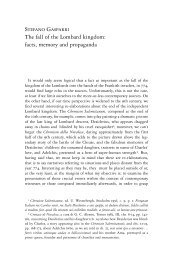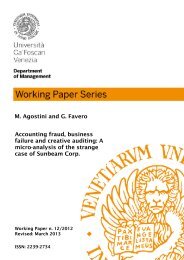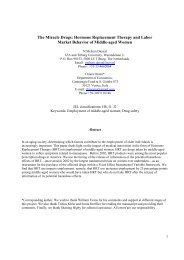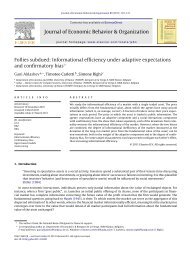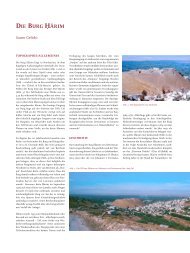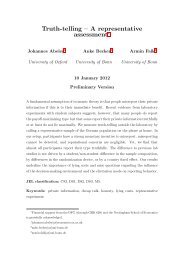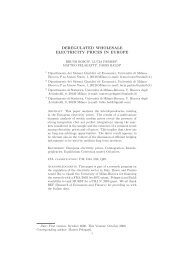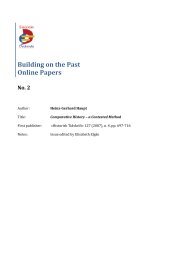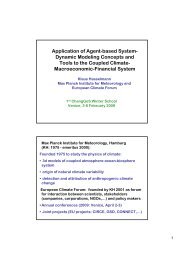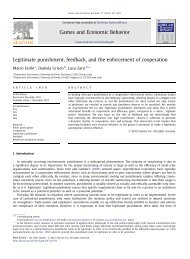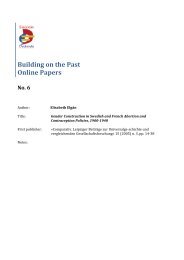The pilot area of Auronzo di Cadore (Belluno) - Università Ca
The pilot area of Auronzo di Cadore (Belluno) - Università Ca
The pilot area of Auronzo di Cadore (Belluno) - Università Ca
Create successful ePaper yourself
Turn your PDF publications into a flip-book with our unique Google optimized e-Paper software.
ponentially increased the number <strong>of</strong> competitors and changed the behaviour<br />
<strong>of</strong> travellers. <strong>The</strong> cost <strong>of</strong> energy is progressively ero<strong>di</strong>ng the margins<br />
<strong>of</strong> return for the accommodation and the transportation compartments.<br />
Water availability and cost is increasingly becoming an issue for the artificial<br />
snow production. <strong>The</strong>se elements are, per se, justifiable reasons to<br />
question the tra<strong>di</strong>tional development model based on the ski-based “white<br />
dream” which has prevailed since the seventies. On the contrary Alpine<br />
tourism needs trademarks (e.g. Pearls <strong>of</strong> the Alps), innovativeness and flexibility.<br />
4. Adaptation should be mainstreamed into long-term tourism planning.<br />
Adaptation to climate change should not be considered in isolated<br />
terms. Climate change is just another pressure that is ad<strong>di</strong>ng up to tourism<br />
systems already under pressure that have specific strengths and weaknesses.<br />
While tourism demand is very adaptive and the tourists’ behaviour<br />
is constantly and rapidly evolving, the tourism supply, meaning the Alpine<br />
destinations as a whole, need more time to plan their actions in order to respect<br />
their social, economic and environmental constraints. <strong>The</strong>re certainly<br />
are autonomous actions (e.g. artificial snow, ski-pistes design, etc. ) that<br />
can be taken by the tourism suppliers, but the most crucial part <strong>of</strong> the adaptation<br />
effort will be played by the so called “planned adaptation”. <strong>The</strong>refore<br />
adaptation should be regarded as a thoughtful and concerted process<br />
<strong>of</strong> tourism development planning for the long-term, and definitely beyond<br />
the mandate <strong>of</strong> one political administration. Climate change is but an opportunity<br />
to involve the most appropriate set <strong>of</strong> local stakeholders into the<br />
process <strong>of</strong> definition <strong>of</strong> the actions to be taken for improving the sustainability<br />
<strong>of</strong> tourism within each Alpine resort.<br />
5. <strong>The</strong>re are “no regret” actions to be taken. Some tourism related issues<br />
are particularly crucial for the Alpine Region beyond the impacts due to climate<br />
change. An Alpine tourism destination needs to be identifiable. Local<br />
culture, han<strong>di</strong>craft, gastronomy and agriculture are elements <strong>of</strong> strength,<br />
among the destination’s specificities, and should be incentivised. Other<br />
crucial factors that can have huge impact on the Alpine tourism are transportation<br />
and energy. A sound reflection about how to improve their sustainability<br />
might be appropriate for most <strong>of</strong> the Alpine resorts.<br />
6. People <strong>of</strong> the Alps are ready. Raising the awareness <strong>of</strong> the stakeholders<br />
inclu<strong>di</strong>ng tourists, population and businesses on the impact <strong>of</strong> climate<br />
change on tourism in the Alps is one <strong>of</strong> the goals <strong>of</strong> the whole project.<br />
However, in the participatory workshops that have been taking place during<br />
the duration <strong>of</strong> the project the local stakeholders have shown to be the<br />
sentinels <strong>of</strong> the climatic changes that have already happened. <strong>The</strong>y are<br />
already deeply interested and aware about this issue. Moreover they have<br />
expressed the desire for a higher degree <strong>of</strong> inclusivity and participation.<br />
Indeed, what is still missing in many destinations is the capacity to let the<br />
stakeholders sit together around one table and agree on the way to proceed<br />
for improving the situation. In the <strong>pilot</strong> sites where it has been tested, the<br />
ClimAlpTour e-tool has provided the opportunity and the methodology to<br />
54




